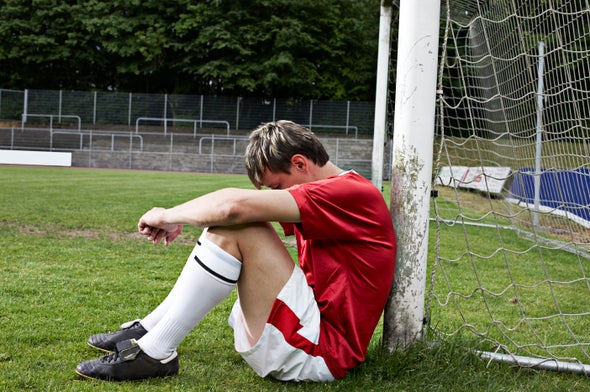How Can I Succeed at the First Time but Fail When I Attempt Again Reddit
Failure Found to Be an "Essential Prerequisite" for Success
Scientists use big information to sympathize what separates winners from losers

The recipe for succeeding in any given field is hardly a mystery: practiced ideas, hard piece of work, bailiwick, imagination, perseverance and maybe a picayune luck. Oh, and allow's not forget failure, which Dashun Wang and his colleagues at Northwestern Academy telephone call "the essential prerequisite for success" in a new paper that, among other things, is based on an analysis of 776,721 grant applications submitted to the National Institutes of Health from 1985 to 2015.
In their endeavour to create a mathematical model that can reliably predict the success or failure of an undertaking, the researchers also analyzed 46 years' worth of venture capital startup investments. They also tested the model on what Wang calls their "least conventional" just notwithstanding important data set up — 170,350 terrorist attacks carried out betwixt 1970 and 2017.
The takeaway? "Every winner begins as a loser," says Wang, associate professor of management and organizations at Northwestern's Kellogg School of Direction, who conceived and led the study.
But not every failure leads to success, he adds. And what ultimately separates the winners from the losers, the research shows, certainly is not persistence. One of the more intriguing findings in the newspaper, published this week in Nature is that the people who somewhen succeeded and the people who eventually failed tried basically the same number of times to achieve their goals.
It turns out that trying once again and once again only works if you learn from your previous failures. The idea is to work smart, non hard. "You lot take to effigy out what worked and what didn't, and and so focus on what needs to exist improved instead of thrashing effectually and changing everything," says Wang. "The people who failed didn't necessarily work less [than those who succeeded]. They could actually accept worked more; it'due south just that they fabricated more unnecessary changes."
As they explored "the mechanisms governing the dynamics of failure" and built their model, Wang's team identified what they describe as previously unknown statistical signatures that separate successful groups from nonsuccessful groups and brand it possible to predict ultimate outcomes.
One such key indicator (also keeping the stuff that works and focusing on what doesn't) is the time between consecutive failed attempts, which should subtract steadily. In other words, the faster y'all neglect, the better your chances of success, and the more time betwixt attempts, the more likely you are to fail again. "If someone has applied for a grant and they are three failures in," Wang says, "if we only look at the timing between the failures, we will be able to predict whether they will eventually succeed or not."
The massive NIH database, which Wang calls a "graveyard full of human failures," turned out to be a researcher's dream come true. "For every principal investigator," explains Wang, "we know exactly when they failed, and we know how badly they failed considering we know the scores of the proposal. And we also know when they somewhen succeeded, after failing over and over, and got their starting time grant."
For the startup domain, success was either an IPO or a high-value merger and acquisition. And for terrorism, attacks that killed at least one person were classified equally successes, whereas failures were attacks that did not claim casualties. The average number of failures for those who failed at least one time earlier success was 2.03 for NIH, 1.5 for startups and 3.90 for terrorist groups.
Working with such large-scale information, Wang and his colleagues were able to identify a critical point common to each of the hundreds of thousands of undertakings they analyzed, a fork in the road where one path leads to a progression region and one leads to a stagnation region. Every bit the paper explains, "2 individuals near the critical signal may initially appear identical in their learning strategy or other characteristics yet depending on which region they inhabit, their outcomes following failures could differ dramatically."
This diverging pattern of performance increases with each new attempt, says Wang, although in some cases information technology is apparent which region a person is in as early as the second attempt.
Wang points out that the existence of the tipping bespeak cuts against the traditional explanations for failure or success, such as luck or a person's work habits. "What nosotros're showing here is that even in the absenteeism of such differences, you tin can still have very dissimilar outcomes," he says. What matters is how people fail, how they reply to failure and where those failures lead.
Looking ahead, Yian Yin, the first writer of the study, says next steps include refining the model to quantify other individual and organizational characteristics besides learning from past failures.
Wang's model, tested now in 3 disparate domains, shows hope as a tool in other arenas, says Albert-László Barabási, managing director of the Center for Circuitous Network Research at Northeastern University and author of The Formula: The Universal Laws of Success. "There are countless works trying to understand how people and products succeed," he says. "Even so, in that location is very picayune understanding of the role of failure. Wang's piece of work fundamentally rewrites our agreement of success, showing the central role failure plays in it, finally offer a methodological and conceptual framework to put failure where information technology belongs inside the catechism of success."
Source: https://www.scientificamerican.com/article/failure-found-to-be-an-essential-prerequisite-for-success/

0 Response to "How Can I Succeed at the First Time but Fail When I Attempt Again Reddit"
Post a Comment